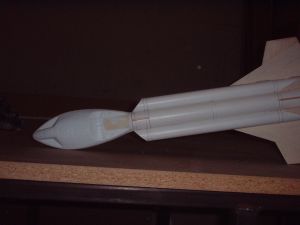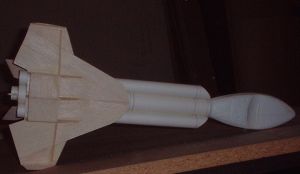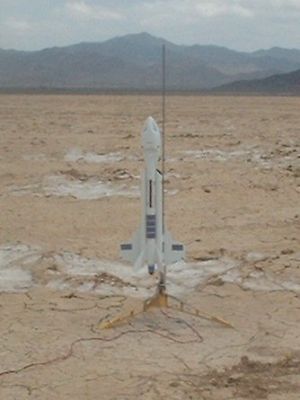| Construction Rating: | starstarstarstarstar_border |
| Flight Rating: | starstarstarstarstar |
| Overall Rating: | starstarstarstarstar |
| Manufacturer: | Sirius Rocketry  |
Brief:
From the Sirius website:
"Beginning in the late 21st Century, the growing commercialization of space created a great demand for the regular and reliable transportation of cargo and passengers. The Cestris class of interplanetary transport vehicles were the workhorses of the fleet, part of an intermodal transport system that used ”Interplanetainer” modular containers to move cargo, ferry space tourists, generate power, supply research bases and much more. The Interplanetainers could be carried on train, truck, ship, and space cargo transport. Some cargo containers could also be magnetically accelerated into space by launchers located on the moon, where they would be picked up in orbit, allowing for longer-distance cargo missions. The Cestris class ships could carry two Interplanetainers each, and work hard to supply the demand created by humankind’s reach into the solar system."

 The S.S. Cestris is a futuristic interplanetary transport vehicle. It is a single stage
skill level 3 rocket with a very unique vacuformed nose cone.
The S.S. Cestris is a futuristic interplanetary transport vehicle. It is a single stage
skill level 3 rocket with a very unique vacuformed nose cone. Construction:
The parts list:
- 1/8" diameter dowel 1-1/4" long
- 1/8" dia. dowel 3" long (2)
- 1/8" dia. dowel 3-1/4" long
- Motor Mount tube BT-50 2-3/4" long
- 3/32" thick balsa sheet 4x12" long
- 3/32" thick balsa sheet 4x16" long
- Main body tube BT-55 14" long
- Intake body tubes BT-50 14" long (2)
- Command Cone kit (Nose cone, comes in it own little kit)[P/N # S-0102]
- S.S.Cestris assembly manual
- 18" dia. Mylar chute kit
- Fin pattern sheet (P/N S-0013-02)
- Intake tube cutting and marking guide (P/N S-0013-03)
- Self Adhesive detail wrap sheets (P/N S-0013-01)
- CR-5055 centering rings (2)
- Thrust ring/ engine block
- Engine hook 2-3/4" long
- 3/16" launch lug 2" long
- 1/4" wide elastic shock cord- 36" long
- Kevlar® Cord 18" long
- Decal sheet #1 (P/N S-0013-04)
- Decal Sheet #2 (P/N S-0013-05)
- Decal Sheet #3 (P/N S-0013-06)
As with any kit, the parts layout can either build up the excitement of the build or give one the attitude of 'well, it won't be hard or take too long'. The Cestris parts certainly did the former. As I laid the parts out, my anticipation heightened. I couldn't wait to get started. The build itself was pretty straightforward. Instructions were easy to follow. There are some body tube wraps that need to be cut out and attached. I was not sure exactly what they're for, but I liked the different look it gave to the rocket. The little problem I encountered was step #24. You must glue the scramjet intake sides to the scramjet intake bottoms. I think it was more myself than the instructions, but make sure you have the grain going in the right direction or it won't come out correct. The main rocket assembly was pretty basic.


Now on to the nose cone. My advice: take your time! I tried to get this rocket built in a day and that was a mistake. The nose comes in its own separate little kit complete with its own instructions. Again, I can't stress enough, take your time. It's a bit tricky cutting the 2 halves out so go slowly and carefully. The recommended adhesive was liquid plastic cement and tube type plastic cement. This is what I used and it worked just fine. My only mistake was, as I was moving pretty fast, I didn't allow sufficient time for the tube type cement to dry and I used a bit too much (the instructions kind of show how much to use, but you could use much less and still achieve a good bond). As a result the plastic softened so much so that it was mushy and when I went to pick it up and handle it, I deformed it. (This was at the step where you glue the tube into one half of the nose cone.) %#$*! It took a few sessions of filling and sanding, but it turned out OK. Remember, take your time with nose cone.


Finishing:
Finishing was again pretty much like any other rocket. Primer, sand, primer, sand, etc. Then paint. The nose cone
painted up just fine. Just be careful what type of paint you use as some paints may attack the plastic. I really liked
the many different choices you had with the decals. It really gives a person the opportunity make the kit your own and
yet still be different from everyone else's. The kit looks fantastic when finished.
Construction Rating: 4 out of 5

Flight:
The recommended motor for the fist flight is a D12-5. Well by this time I had purchased a 24/40 casing so I decided
to use an AT D15-4. (I just realized that this was not one of the recommended motors. Oops.) I loaded it up and taped
the motor in. When building, I did not modify the motor mount to accept a reload case so I had to just tape it in. It
worked just fine. 3, 2, 1, lift-off. Instantaneous ignition. The rocket did a little loop-de-loop on the way up,
otherwise it was a nice straight boost. Parachute ejected at apogee and the 18" mylar chute deployed fully,
bringing it gently back to earth. I was very pleased.
Recovery:
Recovery was perfect.
Flight Rating: 5 out of 5
Summary:
This is a fantastic kit to build and fly and worth is every bit of the $27. It was challenging yet very enjoyable to
put together. The only con might be that the nose cone could present a problem with someone with less experience in
building but not enough to take anything away from this kit.
Overall Rating: 5 out of 5
 |
 |
Flights
Sponsored Ads
 |
 |











